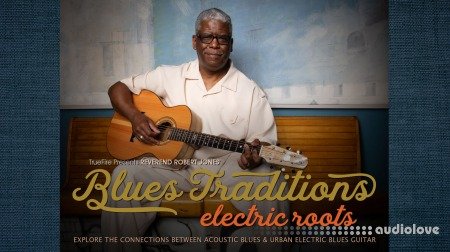Truefire Robert Jones Blues Traditions Electric Roots [TUTORiAL]

P2P | 21 November 2020 | 816.69 MB
Muddy Waters, Elmore James, John Lee Hooker, Howlin' Wolf along with other blues legends of the '40s are all widely respected as the pioneers - the very roots - of urban electric blues. The harder-edged blues vocabulary they created has inspired virtually every generation of blues guitarists since.
However, these pioneers of electric blues were likewise inspired by the vocabulary and stylings of the generation of acoustic blues artists who came before them. Reverend Robert Jones' Electric Roots edition of Blues Traditions explores the connections between the acoustic blues traditions and the early urban electric traditions.
”I've organized the curriculum into four sections. Each section focuses on a specific pioneer of electric blues -- We'll examine their distinct instrumental voice and study the acoustic blues artists that influenced their music and electric presentation.
We'll start with Muddy Waters and study his musical connections to players like Son House and Robert Johnson. Early Delta Blues influences like Charlie Patton, Jimmy Rogers, and Tommy Johnson helped shape the electrified sounds of the legendary Howlin' Wolf.
Elmore James drew upon acoustic blues influences from Robert Johnson and the man with the golden guitar himself, Tampa Red. And finally, we'll look at the master of the Blues Boogie himself, John Lee Hooker and explore the Hill Country Blues traditions through his contemporaries R.L. Burnside and Mississippi Fred McDowell”
For each of the legendary artists, Reverend Jones presents background, demonstrations, and then a series of performance studies and breakdowns, all of which detail the underlying techniques and stylistic approaches that were passed on from generation to generation of guitar players.
"The purpose of these lessons is to show how traditional acoustic blues styles helped to shape the seminal sounds of classic electric blues. We'll focus on the styles of four highly influential blues guitarists, namely Muddy Waters, Howlin' Wolf, Elmore James, and John Lee Hooker. We'll explore some of the general sounds that characterize their sounds, and then we will attempt to trace some of the country blues artists who helped to shape their electric guitar styles. “
home page
However, these pioneers of electric blues were likewise inspired by the vocabulary and stylings of the generation of acoustic blues artists who came before them. Reverend Robert Jones' Electric Roots edition of Blues Traditions explores the connections between the acoustic blues traditions and the early urban electric traditions.
”I've organized the curriculum into four sections. Each section focuses on a specific pioneer of electric blues -- We'll examine their distinct instrumental voice and study the acoustic blues artists that influenced their music and electric presentation.
We'll start with Muddy Waters and study his musical connections to players like Son House and Robert Johnson. Early Delta Blues influences like Charlie Patton, Jimmy Rogers, and Tommy Johnson helped shape the electrified sounds of the legendary Howlin' Wolf.
Elmore James drew upon acoustic blues influences from Robert Johnson and the man with the golden guitar himself, Tampa Red. And finally, we'll look at the master of the Blues Boogie himself, John Lee Hooker and explore the Hill Country Blues traditions through his contemporaries R.L. Burnside and Mississippi Fred McDowell”
For each of the legendary artists, Reverend Jones presents background, demonstrations, and then a series of performance studies and breakdowns, all of which detail the underlying techniques and stylistic approaches that were passed on from generation to generation of guitar players.
"The purpose of these lessons is to show how traditional acoustic blues styles helped to shape the seminal sounds of classic electric blues. We'll focus on the styles of four highly influential blues guitarists, namely Muddy Waters, Howlin' Wolf, Elmore James, and John Lee Hooker. We'll explore some of the general sounds that characterize their sounds, and then we will attempt to trace some of the country blues artists who helped to shape their electric guitar styles. “
home page
Only registered users can see Download Links. Please or login.


No comments yet